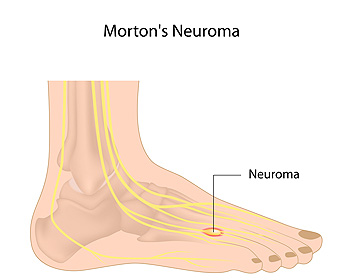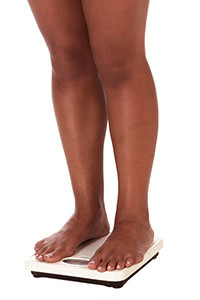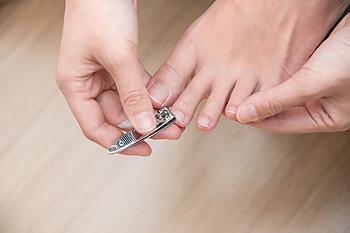NJ (908) 688-5577
NY (212) 737-2528
 If the nerve between one of the toes becomes irritated and inflamed, it’s most commonly referred to as a condition called Morton’s neuroma. Middle-aged women may be more affected than men, possibly because of high heels being worn or shoes fitting too tightly. Jogging may also put pressure on the toes, so runners may be affected as well. Occasionally, other conditions can cause Morton’s neuroma, which typically may include flat feet or bunions. There may be several treatments for this ailment, including massaging and resting the foot, utilizing orthotic devices, which may help to relieve pressure, and choosing a shoe with a wider toe. For patients who experience severe pain, surgery may be an option; part of the nerve may be removed or the space around the nerve may be increased. Please consult a podiatrist for a proper diagnosis and the best treatment option available for you.
If the nerve between one of the toes becomes irritated and inflamed, it’s most commonly referred to as a condition called Morton’s neuroma. Middle-aged women may be more affected than men, possibly because of high heels being worn or shoes fitting too tightly. Jogging may also put pressure on the toes, so runners may be affected as well. Occasionally, other conditions can cause Morton’s neuroma, which typically may include flat feet or bunions. There may be several treatments for this ailment, including massaging and resting the foot, utilizing orthotic devices, which may help to relieve pressure, and choosing a shoe with a wider toe. For patients who experience severe pain, surgery may be an option; part of the nerve may be removed or the space around the nerve may be increased. Please consult a podiatrist for a proper diagnosis and the best treatment option available for you.
Morton’s neuroma is a very uncomfortable condition to live with. If you think you have Morton’s neuroma, contact Glenn Davison, DPM of Advanced Podiatry. Our doctor will attend to all of your foot care needs and answer any of your related questions.
Morton’s Neuroma
Morton's neuroma is a painful foot condition that commonly affects the areas between the second and third or third and fourth toe, although other areas of the foot are also susceptible. Morton’s neuroma is caused by an inflamed nerve in the foot that is being squeezed and aggravated by surrounding bones.
What Increases the Chances of Having Morton’s Neuroma?
Morton’s neuroma is a very treatable condition. Orthotics and shoe inserts can often be used to alleviate the pain on the forefront of the feet. In more severe cases, corticosteroids can also be prescribed. In order to figure out the best treatment for your neuroma, it’s recommended to seek the care of a podiatrist who can diagnose your condition and provide different treatment options.
If you have any questions, please feel free to contact our offices located in Union, NJ and New York . We offer the newest diagnostic and treatment technologies for all your foot care needs.
 Recent research indicates that there’s a direct link between obesity and foot and ankle problems. In addition to tendonitis and general fatigue of the foot, overall foot health, foot function, and proper shoe fitting are among the many things affected by this condition. Typically, obesity affects the ability to exercise due to the increased weight placed on the feet, affecting the tendons and joints. Skeletal problems tend to occur as the sides of the foot and arch are continually stretched, often causing common foot conditions such as gout, ingrown toenails, and fungal infections. It may be advised to start an exercise program for weight loss, and this may typically alleviate foot pain. Try to find shoes that fit the best, preferably with proper cushioning and support. A consultation with a podiatrist is advised if you are experiencing any swelling or pain in your feet.
Recent research indicates that there’s a direct link between obesity and foot and ankle problems. In addition to tendonitis and general fatigue of the foot, overall foot health, foot function, and proper shoe fitting are among the many things affected by this condition. Typically, obesity affects the ability to exercise due to the increased weight placed on the feet, affecting the tendons and joints. Skeletal problems tend to occur as the sides of the foot and arch are continually stretched, often causing common foot conditions such as gout, ingrown toenails, and fungal infections. It may be advised to start an exercise program for weight loss, and this may typically alleviate foot pain. Try to find shoes that fit the best, preferably with proper cushioning and support. A consultation with a podiatrist is advised if you are experiencing any swelling or pain in your feet.
Obesity has become very problematic at this point in time and can have extremely negative effects on the feet. If you’re an obese individual and are concerned about your feet, contact Glenn Davison, DPM from Advanced Podiatry. Our doctor can provide the care you need to keep you pain-free and on your feet.
Obesity and Your Feet
Since your feet are what support your entire weight when standing, any additional weight can result in pain and swelling. Being overweight is one of the main contributors to foot complications.
Problems & Complications
Extra Weight – Even putting on just a few extra pounds could create serious complications for your feet. As your weight increases, your balance and body will shift, creating new stresses on your feet. This uneven weight distribution can cause pain, even while doing the simplest tasks, such as walking.
Diabetes – People who are overweight are at serious risk of developing type-2 diabetes, which has a drastic impact on the health of your feet. As you get older, your diabetes might worsen, which could lead to loss of feeling in your feet, sores, and bruises. You could also become more prone to various infections.
Plantar fasciitis – Pressure and stress that is placed on muscles, joints, and tendons can trigger plantar fasciitis, which is an inflammation of tissue that forms along the bottom of the foot.
If you have any questions please feel free to contact our offices located in Union, NJ and New York . We offer the newest diagnostic and treatment technologies for all your foot and ankle needs.
 Many diabetics incur nerve damage, often making it difficult to feel sores, blisters, or cuts. Checking the feet nightly can be helpful in preventing infections; however, it may be difficult for the diabetic patient to check their feet due to arthritis, diminished eyesight or possible back problems. Having someone check the feet daily or using a small mirror may be beneficial in observing the soles of the feet. Symptoms to look for include any type of irritation, redness, or callus; additionally, paying extra attention to the toes and the ball of the foot is crucial in noticing foot ulcers. Moisturizing is necessary in preventing dry skin, which may cause cracked heels that can become infected. If an electric blanket is used, it may be wise to not use it because of reduced feeling in the feet. Additionally, ice packs can cause numbness in the feet and may not be recommended for this reason. Trimming the toenails is important to do with clippers that are designed for toenails, thereby preventing injuries to the foot. Please consult your podiatrist for advice in keeping your feet healthy
Many diabetics incur nerve damage, often making it difficult to feel sores, blisters, or cuts. Checking the feet nightly can be helpful in preventing infections; however, it may be difficult for the diabetic patient to check their feet due to arthritis, diminished eyesight or possible back problems. Having someone check the feet daily or using a small mirror may be beneficial in observing the soles of the feet. Symptoms to look for include any type of irritation, redness, or callus; additionally, paying extra attention to the toes and the ball of the foot is crucial in noticing foot ulcers. Moisturizing is necessary in preventing dry skin, which may cause cracked heels that can become infected. If an electric blanket is used, it may be wise to not use it because of reduced feeling in the feet. Additionally, ice packs can cause numbness in the feet and may not be recommended for this reason. Trimming the toenails is important to do with clippers that are designed for toenails, thereby preventing injuries to the foot. Please consult your podiatrist for advice in keeping your feet healthy
Diabetic foot care is important in preventing foot ailments such as ulcers. If you are suffering from diabetes or have any other concerns about your feet, contact Glenn Davison, DPM from Advanced Podiatry. Our doctor can provide the care you need to keep you pain-free and on your feet.
Diabetic Foot Care
Diabetes affects millions of people every year. The condition can damage blood vessels in many parts of the body, especially the feet. Because of this, taking care of your feet is essential if you have diabetes, and having a podiatrist help monitor your foot health is highly recommended.
The Importance of Caring for Your Feet
Patients with diabetes should have their doctor monitor their blood levels, as blood sugar levels play such a huge role in diabetic care. Monitoring these levels on a regular basis is highly advised.
It is always best to inform your healthcare professional of any concerns you may have regarding your feet, especially for diabetic patients. Early treatment and routine foot examinations are keys to maintaining proper health, especially because severe complications can arise if proper treatment is not applied.
If you have any questions please feel free to contact our offices located in Union, NJ and New York . We offer the newest diagnostic and treatment technologies for all your foot and ankle needs.